Top 8 Best CRM Email Automation Platforms Driving Success in 2026
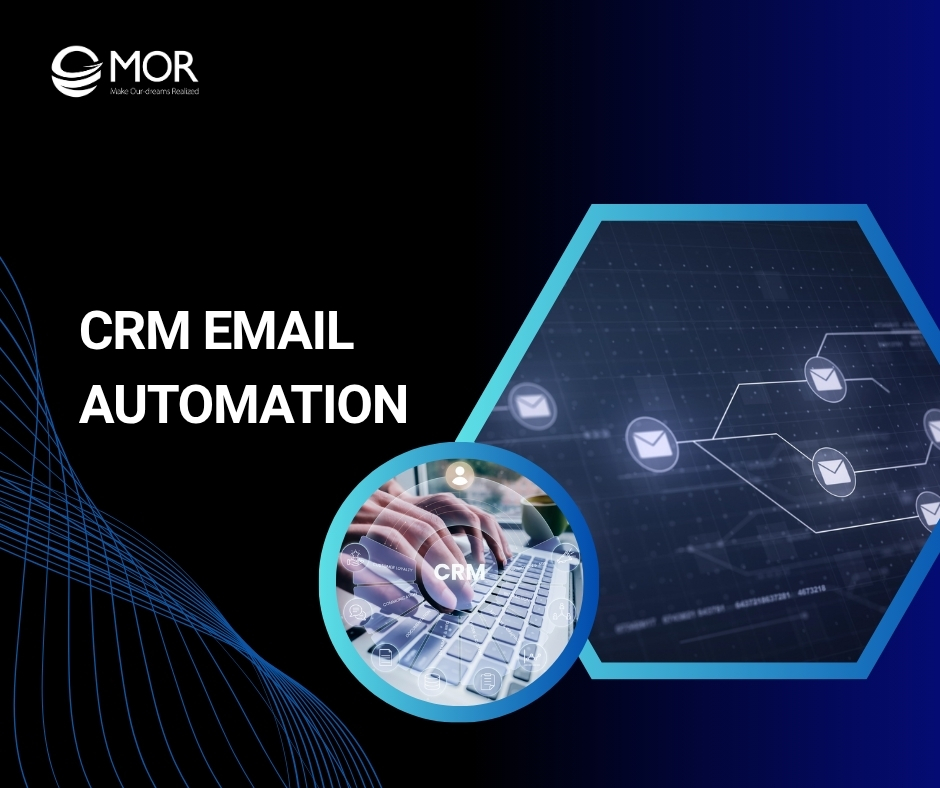
Many businesses struggle to keep customer communication consistent and personal as they grow. CRM email automation solves that by connecting data and messaging to create stronger, smarter relationships. This MOR Software’s guide will highlight the top CRM and email automation platforms of 2026, helping you find the right system to boost engagement, save time, and scale sustainably.
What Is CRM Email Automation?
CRM email automation combines two essential systems: your customer relationship management (CRM) platform and automated email workflows. This pairing helps businesses manage communication, strengthen customer connections, and cut down on repetitive work that slows teams down.
At its core, CRM automation takes care of everyday processes inside your CRM, like sending follow-up messages, updating records, or assigning sales and support activities. Leading solutions like Salesforce or HubSpot CRM handle these automatically, keeping your customer data accurate and your team consistent in every interaction. This makes it easier to manage pipelines and maintain strong client relationships without losing time on manual updates.
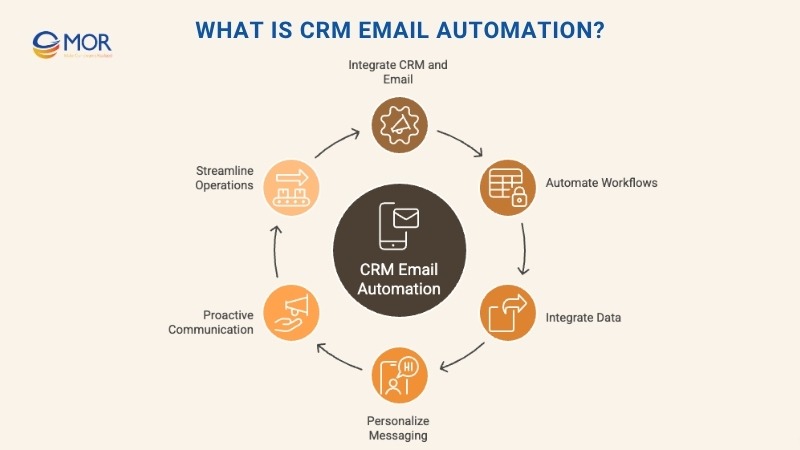
Email automation, a key part of the system, focuses on delivering the right message to the right person at the right time. Instead of typing and sending each email yourself, platforms such as ActiveCampaign and Mailchimp send messages based on customer actions, like signing up, completing a purchase, or going inactive. These messages feel personal, yet they run automatically in the background.
When you start integrating email automation with CRM systems, all your data works together. You can analyze purchase history, engagement patterns, and lifecycle stages to create smart, personalized outreach. This is where the power of CRM for email marketing comes in, it turns your communication from reactive to proactive. With this setup, every email feels timely and relevant, helping your team build trust, boost engagement, and increase conversion rates with less effort.
Why Businesses Need CRM Email Automation Tools
Why should your business invest in a CRM with email automation instead of using separate marketing tools or hiring outside campaign services? The short answer is control, precision, and consistency. A unified system connects your customer data and communication in one place, giving you a full picture of how every lead moves through the sales funnel.
When your team uses CRM and email automation together, you’re not just managing emails, you’re managing relationships. Every contact, campaign, and interaction becomes part of a connected process that saves time and increases accuracy.
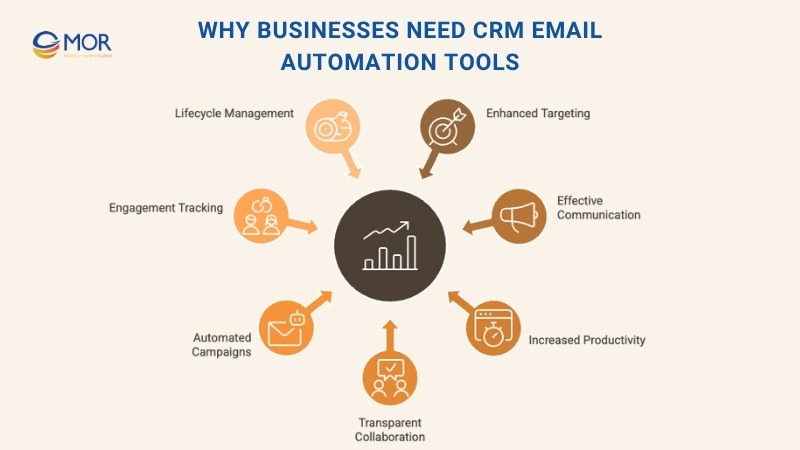
Enhanced Targeting
Integrating your CRM with email tools allows smarter segmentation. Not every customer wants the same message, and sending one generic campaign to everyone often leads to poor engagement. A connected CRM with email automation helps you create groups based on demographics, purchase history, or engagement levels.
This kind of segmentation ensures your outreach feels personal. You might send one message to loyal customers, another to new leads, and a third to those who haven’t interacted recently. Platforms designed for CRM email automation make this process smooth and repeatable.
With CRM and email automation, you can even track visitors who interact with your site or marketing materials, then follow up with automated, relevant campaigns. Over time, these targeted efforts help you turn prospects into paying customers and maintain stronger, more consistent communication across every stage of the buyer journey.
Effective Communication
For most sales teams, email remains the most reliable way to connect with prospects and customers. When paired with CRM email automation, it becomes even more powerful. A CRM system like HubSpot or Salesforce helps you understand who your audience is and how they interact with your brand.
Combining that insight with email tools allows you to send messages that actually feel personal. Data-backed personalization drives stronger results, studies show that personalized emails can see around 29% higher open rates and 41% more clicks compared to generic messages. These small improvements compound quickly when scaled across automated campaigns.
With CRM email marketing, you can test and compare different templates or automated sequences to see which approach performs best. Over time, these insights help your team fine-tune communication, improve engagement, and build relationships that feel authentic instead of automated.
Increased Productivity
With CRM email automation, your team can handle everything from one place instead of switching between apps. When your CRM includes built-in email tools or supports a two-way sync, daily work becomes faster and smoother. You can view contacts, send follow-ups, and track replies, all without leaving the dashboard.
Leading platforms like Salesforce and Zoho CRM let you create reusable email templates and automated sequences that cut down repetitive typing. This setup keeps your communication consistent while freeing your team to focus on what matters most: closing deals and nurturing relationships.
Transparent Collaboration
A CRM with email capabilities keeps everyone on the same page. When emails sync directly into customer profiles, every team member, sales, marketing, or support, can instantly see the full conversation history. No more guessing who said what or digging through old inboxes.
With CRM for email management, all correspondence is stored in shared timelines, offering full visibility into each customer’s journey. That kind of transparency builds accountability and coordination across departments. Without this setup, valuable interactions stay locked inside personal inboxes, leaving teams disconnected and missing critical information that could improve the customer experience.
Automated Campaigns That Scale
A strong CRM email automation system doesn’t just help you plan campaigns, it runs them for you. Once workflows are set up, emails go out automatically based on customer behavior or preset triggers. For instance, when someone signs up for your newsletter or completes a purchase, your CRM can instantly send a welcome or thank-you message without manual input.
Even if you use a dedicated email platform for most campaigns, your CRM remains the central hub that fuels automation. Because it stores all customer data, purchases, engagement history, and preferences, it can determine exactly which messages should reach which audiences and when.
This precision saves time and improves performance. Automated messages are proven to drive results, accounting for roughly 41% of all email-generated orders even though they represent only a small fraction of total sends. With CRM email marketing automation, your campaigns stay consistent, scalable, and effective without constant human effort.
Tracking Engagement Across Campaigns
One major strength of CRM email automation is how easily it connects your campaign performance data with customer profiles. Every email interaction, opens, clicks, and conversions, is automatically logged in your CRM, giving you a clear view of who’s engaging and how.
With email marketing automation CRM tools, you can track engagement metrics in real time and link them to specific contacts, deals, or companies. This lets your team see which campaigns resonate with customers and which need improvement.
When CRM and email marketing are fully integrated, engagement insights don’t just sit in your inbox, they become part of your customer history. That means every sales or marketing interaction is informed by data, helping your team send smarter, better-timed messages that lead to stronger relationships and higher conversions.
Smarter Lifecycle Management
A well-built CRM email automation system goes far beyond sending bulk messages or quick follow-ups. It helps teams manage the entire customer journey, from first contact to long-term loyalty, through targeted and automated messaging.
With email automation CRM platforms, you can design personalized drip campaigns that match each stage of the buyer journey. Leads receive timely updates, product recommendations, or special offers based on their behavior and preferences. This ensures every message feels relevant and helps move prospects closer to conversion.
Done right, lifecycle automation strengthens retention. When communication reflects customer needs and timing, satisfaction grows naturally. Businesses also gain new opportunities for upselling and cross-selling through automated sequences built directly into their CRM workflows.
Through combining the power of automation and data-driven communication, CRM with email automation turns relationship management into a continuous, personalized experience that drives loyalty and long-term growth.
Top CRM Email Automation Platforms in 2026
Which tools truly deliver the best combination of CRM and email automation? And more importantly, which platform fits your business goals?
We’ve gathered the top eight systems that make CRM email automation a core part of their functionality. Each one blends relationship management with automated messaging to help businesses save time, improve targeting, and strengthen customer engagement.
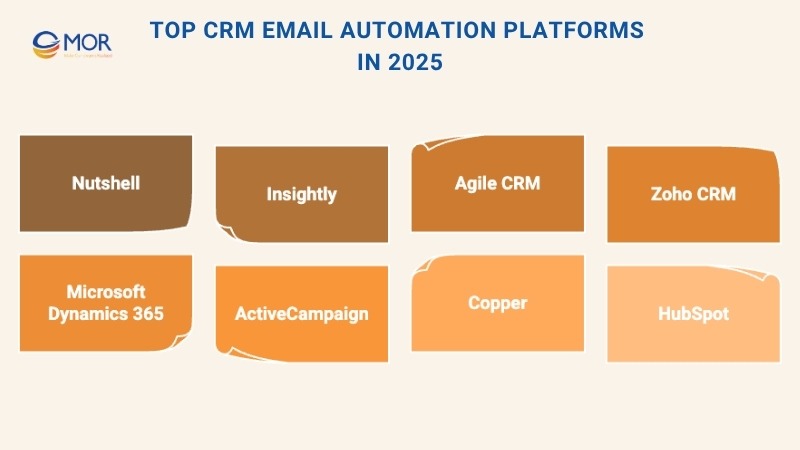
Nutshell
Nutshell stands out as an all-in-one platform that balances simplicity and power. Its CRM and email automation capabilities allow teams to manage communication and customer data without jumping between tools.
The platform includes a complete email automation CRM suite: sequencing, customizable templates, contact filtering, and targeted bulk campaigns. These features help businesses build stronger relationships while cutting down repetitive work.
Nutshell’s personal email sequence tool makes one-on-one outreach effortless. Each sequence stops automatically once a recipient responds and can even trigger based on a lead’s pipeline stage, perfect for nurturing prospects without constant follow-up.
Performance tracking is built in. You can monitor reply rates and campaign performance to refine your approach over time. Prebuilt templates also save teams from typing the same messages repeatedly, speeding up daily communication.
With its two-way sync for Gmail and Office 365, Nutshell keeps your inbox and CRM perfectly aligned. Users of other email providers can still send and track messages directly from the platform.
There’s also an SMS add-on that pairs text and email campaigns, increasing engagement opportunities.
For businesses seeking an intuitive yet data-driven solution, Nutshell is one of the most reliable email CRM platforms available in 2026, smart, scalable, and ready to simplify your entire communication process.
Insightly
Insightly has earned a strong reputation among CRMs for helping businesses nurture lasting customer relationships. A key part of that success lies in its built-in CRM email automation tools, which simplify communication and campaign management for growing teams.
Users can design, schedule, and send emails directly within the platform while tracking performance through real-time analytics dashboards. This visibility helps teams see which campaigns resonate and where adjustments are needed.
The platform also includes reusable email templates, saving sales and marketing teams hours of manual work each week. Whether it’s a one-time announcement or a full campaign, Insightly makes the process fast and repeatable.
For extended flexibility, Insightly integrates smoothly with Outlook, Gmail, Mailchimp, and Zapier, ensuring seamless CRM and email integration across your entire tech stack. It’s a solid choice for businesses that want both structure and simplicity in their communication strategy.
Agile CRM
Agile CRM blends classic relationship management with advanced CRM email automation, giving teams the tools to create, send, and track personalized email campaigns effortlessly.
Users can choose from a wide range of modern templates and build campaigns through an intuitive drag-and-drop editor. The platform’s personalization options make every message feel authentic, automatically inserting contact details like name, location, or industry to tailor communication at scale.
Tracking performance is just as simple. Agile CRM’s reporting dashboard displays key metrics such as open and click-through rates, helping teams evaluate campaign success. Its built-in lead scoring system uses this data to identify which prospects are most engaged, allowing for more focused follow-ups.
Beyond that, Agile CRM supports A/B testing, social sharing, and autoresponders to automate ongoing campaigns. These combined tools make CRM email marketing efficient, data-driven, and perfectly aligned with the modern buyer journey.
Zoho CRM
Zoho CRM is part of Zoho’s broad business software ecosystem, which covers everything from accounting to customer support. Within that suite, its CRM email automation tools stand out for their balance of simplicity and control.
Sales teams can use Zoho’s drag-and-drop email template builder to design professional messages quickly, complete with text, images, and tables. The reusable templates eliminate the need to rewrite the same outreach emails, saving hours each week.
The platform also provides clear tracking and analytics. Users can see when each message was sent, opened, and read, while sales managers can view performance metrics for every team member to spot trends and improvement areas.
For large-scale email campaigns, Zoho CRM connects seamlessly with Zoho Campaigns, the company’s dedicated marketing automation tool. This integration expands functionality without disrupting workflow, keeping all CRM email automation data synchronized across platforms. The result is a flexible, all-in-one solution ideal for growing businesses that want both precision and scalability.
Microsoft Dynamics 365
Microsoft Dynamics 365 brings enterprise-grade intelligence to CRM email automation, helping businesses drive higher engagement and return from every campaign. Its biggest strength lies in dynamic personalization, each email can automatically adapt content based on customer data stored in the CRM. Messages reflect individual preferences, purchase history, or behavior, making communication feel genuinely one-to-one.
The platform allows you to run multiple campaigns at once, each tailored to specific audience segments. Beyond email, it supports push notifications, text messages, and social interactions for a complete omnichannel experience.
Marketers can use the built-in journey builder to design detailed engagement paths, mapping when and how customers receive messages throughout their decision process. Everything runs automatically once activated, keeping outreach consistent and timely.
As one of the top-rated tools in Gartner’s Magic Quadrant, Dynamics 365 earns strong reviews for its automation depth, advanced personalization, and flexibility. Businesses that evaluate the CRM company Salesforce on email automation in CRM often find Dynamics 365 to be a strong alternative, ideal for enterprises looking for scalable, data-driven marketing automation.
ActiveCampaign
ActiveCampaign stands out from other tools on this list because it began as a marketing automation platform before evolving into a full CRM with email automation. This origin makes it a favorite for teams that value marketing power and flexibility above traditional CRM management.
The interface feels more like advanced email marketing software than a typical CRM. Users can design newsletters, create automated workflows, schedule campaigns, and track engagement, all from one clean dashboard. Its extensive template library, A/B testing features, and detailed segmentation options make personalizing campaigns effortless.
ActiveCampaign also connects with more than 250 third-party tools, including PayPal, Shopify, and Facebook, helping businesses build a connected marketing ecosystem. These integrations support both CRM email marketing automation and eCommerce engagement strategies.
For companies prioritizing automation-driven marketing, ActiveCampaign delivers both creativity and control. While pricing starts around $49 per month, its combination of campaign automation and CRM data management makes it a strong choice for organizations focused on scaling personalized outreach efficiently.
Copper
Copper takes a different approach to CRM email automation by building its entire experience around Google Workspace. Designed specifically for Gmail users, it integrates directly into the inbox, giving teams the comfort of managing customer relationships right where they already work.
Because the system operates inside Gmail, the setup is fast and the learning curve minimal. Users can view contact details, track interactions, and manage deals without switching tabs. For companies deeply rooted in Google’s ecosystem, this workflow feels natural and effortless.
Copper’s built-in email tools cover the basics, sending one-off messages, using templates, and setting up simple automated replies. For more advanced automation, users can connect Copper with Mailchimp to access campaign workflows and segmentation features.
While its native email automation features are limited, Copper is ideal for teams that want a lightweight, Gmail-based CRM with core functionality. It also works well for service-focused businesses like moving companies, where CRM with email automation for moving company workflows can simplify client communication and follow-up directly within Gmail.
HubSpot
HubSpot is one of the most recognized names in marketing and sales software, and its CRM email automation features are a big part of why. The platform combines CRM, email marketing, and analytics into a single, easy-to-manage ecosystem that supports every stage of customer growth.
Users can build automated email sequences, edit templates with a simple drag-and-drop tool, and schedule campaigns that run without manual input. Once live, HubSpot tracks open rates, clicks, and downloads, giving clear visibility into engagement performance.
The platform also includes lead scoring based on past interactions and predictive analytics to estimate conversion likelihood. These insights make it easier for teams to prioritize outreach and focus efforts where they’ll have the most impact.
For companies looking for a complete system that unites marketing, sales, and communication, HubSpot stands among the best CRM for email marketing options in 2026. It delivers a full suite of automation and tracking tools, though pricing may be a consideration for smaller teams ready to scale their campaigns strategically.
CRM Email Automation Platform Comparison 2026
To help you compare these leading platforms at a glance, we’ve summarized their key strengths, integrations, and pricing. This table highlights which CRM email automation tools best fit your business needs in 2026.
Platform | Best For | Key Email Features | Integrations | Starting Price |
Nutshell | Small to mid-sized teams wanting all-in-one simplicity | Email sequencing, templates, SMS add-on, two-way Gmail & Outlook sync | Gmail, Office 365, Zapier | From $19/month |
Insightly | Growing businesses needing built-in automation | Real-time analytics, reusable templates, bulk sends | Outlook, Gmail, Mailchimp, Zapier | From $29/month |
Agile CRM | Sales and marketing teams focused on personalization | A/B testing, autoresponders, lead scoring, drag-and-drop builder | Google Workspace, Shopify, Zapier | Free plan; paid from $8.99/month |
Zoho CRM | Companies using Zoho ecosystem or needing flexibility | Template creator, analytics, manager dashboards | Zoho Campaigns, Google Workspace | From $14/month |
Microsoft Dynamics 365 | Enterprises needing advanced AI personalization | Dynamic content, journey builder, omnichannel automation | Power BI, LinkedIn, Teams | From $65/user/month |
ActiveCampaign | Marketers prioritizing automation over traditional CRM | Drip workflows, A/B testing, segmentation, predictive sending | PayPal, Shopify, Facebook, 250+ apps | From $49/month |
Copper | Google Workspace users wanting a Gmail-native CRM | One-off emails, templates, simple automations | Gmail, Mailchimp, Google Calendar | From $29/month |
HubSpot | Businesses seeking a complete CRM and marketing hub | Automated sequences, lead scoring, analytics, predictive insights | Shopify, Salesforce, WordPress, Slack | Free plan; paid from $45/month |
Real-World CRM Email Automation Examples
Looking to put CRM email automation into action? These proven workflows show how automation can build stronger engagement and drive results from day one.
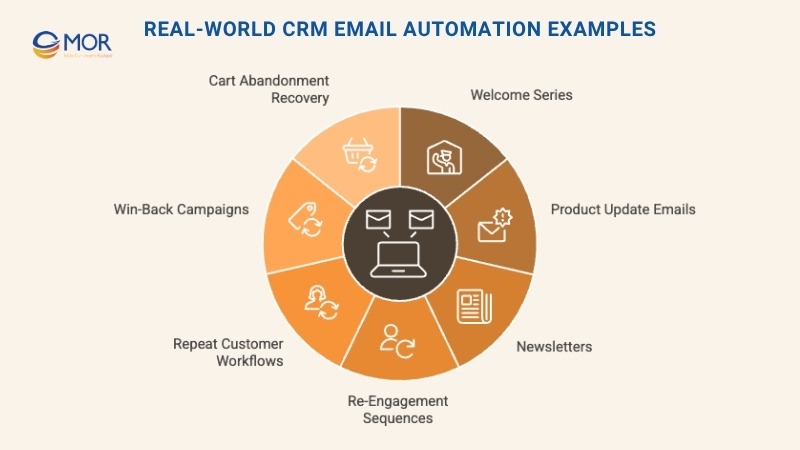
Welcome Series
Your audience is most attentive right after they subscribe. That’s the perfect time to send a short welcome sequence that introduces your brand and sets expectations. A well-planned four-part series might include:
- A friendly greeting: Thank new subscribers and explain what they can expect.
- A value email: Highlight how your brand can help them achieve their goals.
- An educational tip: Share a simple, actionable insight related to your product or service.
- A self-selection email: Encourage readers to choose what topics or offers interest them most.
This kind of automation is easy to set up in platforms like HubSpot or ActiveCampaign and keeps engagement high from the start.
Product Update Emails
CRM and email automation make it easy to send personalized product updates when new items launch or come back in stock. Instead of sending generic announcements, modern tools use dynamic content to adjust each message based on subscriber data, purchase history, interests, or even local weather.
For example, a retailer can automatically feature seasonal products based on location or recommend similar items to past buyers. This form of CRM email marketing automation turns product alerts into relevant, timely messages that feel tailored to each customer’s experience.
Newsletters
Many brands treat newsletters as one-time broadcasts, but CRM email automation opens a smarter approach. Instead of constantly creating new content, you can automate the delivery of your most popular, evergreen newsletters, those that consistently resonate with your audience.
Setting up recurring automated sends, your best-performing content keeps working for you long after it’s written. Marketing experts like Peter McPherson call this an “evergreen newsletter,” a system that nurtures, segments, and even monetizes your audience automatically. With the right CRM email examples, timeless content can keep generating engagement 24/7.
Re-Engagement Sequences
Even the most engaged lists fade over time. On average, businesses lose about a quarter of their subscribers each year, some unsubscribe, others simply stop opening emails. That’s where a re-engagement automation comes in.
Using CRM and email automation, you can trigger targeted sequences designed to win back inactive contacts. Messages might include special offers, reminders, or short surveys to learn why subscribers disengaged. This workflow helps revive dormant leads, clean up your database, and strengthen your sender reputation while improving long-term retention.
Repeat Customer Workflows
Your most valuable customers are the ones who already trust your brand. With CRM email automation, you can nurture those relationships automatically while introducing new products or services they’ll genuinely appreciate.
A simple two-step automation works well here:
- Check in: Two or three days after their order arrives, send a friendly message asking how they’re enjoying their purchase. This shows care and opens the door for feedback.
- Follow up: A few days later, send product suggestions or complementary items that fit their recent purchase. You might also include reviews or testimonials to reinforce their decision.
This kind of email automation CRM strategy does more than drive repeat sales, it strengthens loyalty. Reminding customers of the value they’ve already received, you keep them engaged and confident in your brand.
Win-Back Campaigns
Sometimes even loyal customers go quiet. They’ve made a purchase before but stopped opening your emails over time. That’s where a win-back email campaign powered by CRM email automation can make a real difference.
The goal is simple, remind customers why they connected with your brand in the first place. Start by acknowledging their absence with a friendly “We miss you” message. Then, shift focus to what they’re missing out on: new features, best-selling products, or the success stories of other satisfied customers.
Using automation, these campaigns can trigger after a set period of inactivity. When done right, a CRM email marketing win-back sequence reawakens interest, reignites engagement, and often turns past buyers into repeat customers.
Cart Abandonment Recovery
Every online store faces the same problem, customers add items to their cart but never complete the checkout. A cart abandonment automation powered by CRM email automation helps turn those missed opportunities into sales.
The most effective setups include a short, three-step sequence:
- First reminder: Send a friendly nudge after 24 hours showing what’s still in their cart.
- Address hesitation: After 48 hours, follow up with reassurance, highlight reviews, shipping info, or return policies to ease doubts.
- Offer incentive: After 72 hours, send a limited-time discount or free shipping code to encourage action.
With CRM email marketing automation, these messages are fully personalized and triggered automatically. They reconnect customers with their intent to buy and often recover sales that might have been lost for good.
How to Choose the Right CRM Email Automation Software?
The best CRM email automation platforms make marketing and customer communication work together naturally. Whether you’re looking for a system that already includes built-in automation or planning to connect your current CRM with an external email tool, a few factors can help you find the right fit.
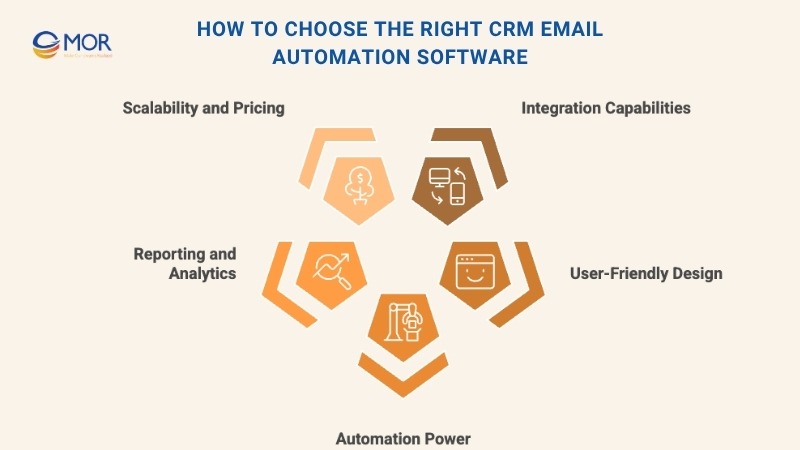
Integration Capabilities
Smooth integration is everything. Before committing, confirm that the email software connects easily with your existing CRM. Most providers offer a free trial, so use it to test how well the two systems sync customer data, automate campaigns, and share analytics.
During the trial, experiment with sending emails, syncing contacts, and tracking activity to see how the tools work together. If you encounter problems, reach out to customer support right away, how quickly they respond says a lot about the service quality.
Strong CRM and email integration ensures that your marketing data flows seamlessly between platforms, letting you manage campaigns, measure results, and maintain consistent communication without switching between multiple systems.
User-Friendly Design
Building engaging, branded emails shouldn’t feel complicated. When testing CRM email automation platforms, look for tools with a clean, intuitive interface that lets you design campaigns quickly without technical skills.
A good CRM for email management includes a visual drag-and-drop editor and ready-made templates that make customization simple. You should be able to add text, images, buttons, and layouts effortlessly, no coding required.
The goal is to empower your team to create professional, consistent emails fast. A user-friendly platform helps new users adapt quickly and keeps your marketing workflow smooth from day one.
Automation Power
Strong CRM email automation features are what separate basic systems from true marketing engines. Look for tools that let you build multi-step drip sequences and control exactly when each message is sent. Timing, triggers, and personalization should all be part of the setup.
For example, when a sales rep moves a lead to the next stage of the pipeline, the system should automatically send a tailored follow-up. With customizable templates and workflow triggers, your email automation CRM can nurture leads, confirm deals, or re-engage prospects, without any manual work.
Automation like this keeps communication consistent, ensures no lead is forgotten, and helps your team focus on building relationships instead of managing tasks.
Reporting and Analytics
Data is what makes CRM email automation truly effective. To improve your campaigns over time, you need clear insight into how people interact with your messages. Look for tools that track open rates, click-throughs, conversions, and overall engagement trends.
A solid CRM email marketing platform should provide detailed dashboards and reports that show what’s working and what isn’t. These insights help your team adjust subject lines, content, and timing to keep performance strong.
You can also run A/B tests to compare different versions of your emails and see what your audience responds to best. With accurate analytics and reporting, every campaign becomes an opportunity to learn, refine, and grow results.
Scalability and Pricing
When comparing CRM email automation platforms, don’t just focus on features, look closely at their limits and pricing tiers. Many tools restrict the number of contacts, emails, or workflows available on lower plans, which can quickly become a bottleneck as your marketing grows.
Check how each provider handles contact caps and monthly send volumes. Compare the cost for the same audience size across your top options to see which offers real value.
Choosing a scalable email marketing automation CRM ensures your system can grow with your business. The right platform should let you expand campaigns, add users, and increase email volume without forcing a major upgrade or migration later on.
CRM Email Automation Trends Shaping 2026
The landscape of CRM email automation is evolving fast, driven by smarter tools and changing customer expectations. Staying current with these shifts helps businesses create stronger, more personal connections with their audiences.
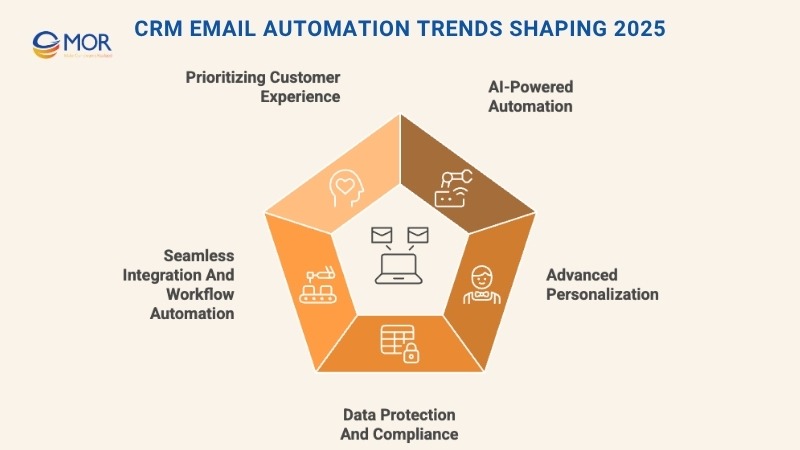
AI-Powered Automation
Artificial intelligence is reshaping how teams manage campaigns and customer relationships. Modern AI-powered CRM and email marketing tools use predictive scoring, content suggestions, and automated personalization to make every interaction more relevant.
AI can analyze engagement data to determine the best send times, adjust dynamic content on the fly, and refine segmentation automatically. Even smaller companies can now run sophisticated, data-driven campaigns that used to require large marketing teams. This aligns closely with the rise of app marketing automation, where AI helps deliver the right message across web and mobile channels at once.
Advanced Personalization
Basic personalization, like adding a name to an email, no longer cuts it. Today’s best CRM email automation systems tap into deep customer data to craft unique, timely experiences for every subscriber. The combination of CRM insights and behavior tracking allows brands to personalize not just what they send, but also the timing and delivery method of each message.
The result is hyper-relevant content, higher engagement, and more meaningful relationships built on genuine understanding of customer intent.
Data Protection and Compliance
Stricter privacy laws are reshaping how businesses handle customer information. Modern CRM email automation tools must support secure data storage, consent tracking, and transparent communication about how customer data is used. Giving users clear control over their information builds credibility and ensures compliance with global regulations.
Investing in strong data governance within your CRM email marketing setup not only prevents legal issues but also strengthens customer trust, a key factor in long-term loyalty.
Seamless Integration and Workflow Automation
The push toward connected systems continues to accelerate. Businesses are increasingly integrating email automation with CRM systems and other business platforms to reduce manual work and improve data flow. When your CRM connects with marketing, eCommerce, and analytics tools, repetitive tasks run automatically, saving hours of effort.
Automation frees teams to focus on strategy and innovation instead of day-to-day maintenance, driving faster responses and a smoother customer journey.
Prioritizing Customer Experience
Every touchpoint matters. Unifying CRM and email automation, companies can personalize communication, send relevant offers, and deliver meaningful content based on real-time customer data. This approach deepens relationships and builds brand loyalty.
Focusing on the overall experience, not just the transaction, turns one-time buyers into long-term advocates, making CRM email automation a cornerstone of customer satisfaction in 2026.
Partner With MOR Software To Elevate Your CRM Email Automation
We help businesses design CRM email automation systems that don’t just send messages, they build stronger relationships. Our teams specialize in integrating leading CRM platforms like Salesforce with automated communication tools to make every customer interaction timely, relevant, and measurable.
At MOR Software, automation begins with understanding your data. We develop solutions that connect customer records, behavioral insights, and marketing workflows into one cohesive ecosystem. From segmentation and lead scoring to drip campaigns and predictive analytics, we make sure every process runs smoothly in the background while your team focuses on strategy.
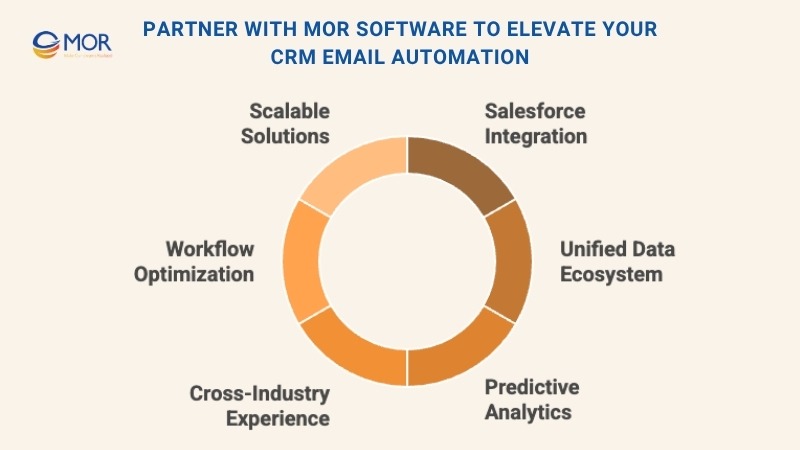
Our engineers bring hands-on experience from projects across industries like finance, healthcare, manufacturing, and retail. Whether it’s syncing Salesforce with third-party marketing tools, building analytics dashboards, or enabling real-time reporting, we deliver systems that scale and perform reliably.
Beyond development, we guide you through implementation, optimizing workflows, testing integrations, and training your teams for long-term success. The result is a unified automation framework that improves communication, increases retention, and turns customer data into actionable growth opportunities.
Contact us today to explore how we can take your CRM email automation to the next level.
Conclusion
Effective CRM email automation is more than a tool, it’s a strategy for lasting customer relationships and measurable growth. The right system connects your data, communication, and workflows into one powerful engine that drives engagement effortlessly. Whether you’re refining campaigns or scaling globally, automation keeps your business consistent and customer-focused. Ready to transform your marketing? Contact MOR Software today and discover how we can help you build smarter, data-driven automation that delivers real results.
MOR SOFTWARE
Frequently Asked Questions (FAQs)
What is CRM email automation?
CRM email automation uses customer relationship management systems to send, schedule, and personalize emails automatically. It helps businesses maintain consistent communication and deliver the right message at the right time without manual effort.
How does CRM email automation work?
It connects your CRM database with an email platform. When specific actions occur, like a new signup, purchase, or inactive period, the system automatically triggers personalized emails such as reminders, promotions, or thank-you notes.
What are the main benefits of using CRM email automation?
The main benefits include saving time, improving targeting accuracy, boosting engagement, and maintaining consistent communication. It also tracks valuable metrics like open rates and conversions to help refine future campaigns.
Who can benefit from CRM email automation?
Any business that depends on customer interaction can benefit, including sales, marketing, and support teams. It’s especially useful for eCommerce, B2B, and service-based companies that manage large contact lists.
What types of emails can be automated with CRM tools?
You can automate welcome messages, product updates, follow-ups, abandoned cart reminders, customer surveys, re-engagement campaigns, and even birthday or milestone messages.
How is CRM email automation different from traditional email marketing?
Traditional email marketing sends the same message to everyone, while CRM email automation uses real-time data and customer behavior to send targeted, personalized messages that feel more relevant and human.
What features should I look for in a CRM email automation tool?
Key features include workflow automation, audience segmentation, analytics dashboards, drag-and-drop email builders, integration with other platforms, and A/B testing capabilities.
How can CRM email automation improve customer relationships?
It builds stronger relationships by sending personalized, timely emails that show customers they’re understood and valued. This level of personalization drives trust and long-term loyalty.
Is CRM email automation suitable for small businesses?
Yes. Many CRM systems offer affordable automation plans for small businesses. They can start with a few basic workflows and expand automation features as they grow.
Can CRM email automation help increase sales?
Yes. Automated campaigns can recover abandoned carts, nurture leads, promote upsells, and send tailored offers that directly influence purchasing decisions and repeat orders.
What metrics should I track in CRM email automation?
Focus on open rates, click-through rates, bounce rates, conversions, and unsubscribe rates. These metrics reveal how effective your campaigns are and where improvements are needed.
How secure is CRM email automation for customer data?
Most modern CRM tools use encryption, data access controls, and comply with regulations like GDPR or CCPA. Still, companies should maintain transparency and get consent before sending automated messages.
Rate this article
0
over 5.0 based on 0 reviews
Your rating on this news:
Name
*Email
*Write your comment
*Send your comment
1